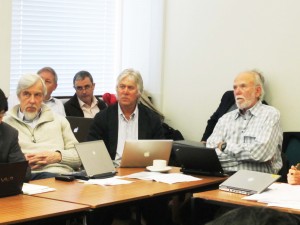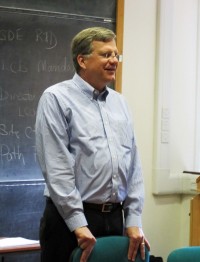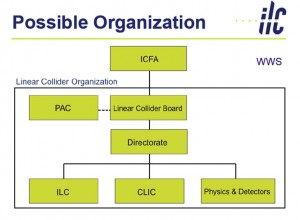The International Linear Collider Steering Committee (ILCSC), a subcommittee of the International Committee for Future Accelerators (ICFA), provides oversight to the Global Design Effort. As we approach our final milestone, the publication of the ILC Technical Design Report, the ILCSC is in the process of creating a new organisational structure and mandate for future work towards a linear collider. This new organisation will have one director, with responsibility for ILC, CLIC and detector development. The first order of business is to appoint this director. The next order of business is to begin to incrementally develop a new, more integrated organisation. For the ILC accelerator effort, a new mandate is being developed that will continue the high-priority superconducting radiofrequency (SCRF) R&D systems tests, as well as developmental work towards higher energy.
One of the primary goals of the proposed new organisation is to integrate the efforts towards a superconducting RF machine (ILC), a two-beam accelerator (CLIC) and the associated physics and detector efforts. The new proposed organisation is shown below:
The Linear Collider Board (LCB), under ICFA, will replace the present ILCSC and will have the broad mandate of overseeing the preparation of a linear collider proposal. A draft mandate for the LCB was discussed at ILCSC and ICFA and it gives the LCB the role of creating a directorate to coordinate the activities for the ILC, CLIC and physics and detectors, and to focus those efforts towards a project proposal whose “timing and contents will reflect the LHC physics data.” The LCB will consist of 16 members, five from each region (Europe, Asia and the Americas) plus a chair.
As stated above, the most immediate task is to appoint a Linear Collider Director, and ICFA has authorised a worldwide search that is just getting under way. The search committee consists of Joachim Mnich (DESY) and Manfred Krammer (new ECFA chair) from Europe; Pier Oddone (Fermilab and ICFA chair) and William Trischuk (University of Toronto) from the Americas; and Sachio Komamiya (University of Tokyo) and Jie Gao (IHEP) from Asia. Nominations are welcome. The Linear Collider Director will lead the global linear collider community towards realising an electron-positron linear collider.

CERN Director General Rolf Heuer, GDE Americas Regional Director Mike Harrison and GDE Director Barry Barish during the February ILCSC meeting. Image: ILC
Of immediate concern to those of us in the GDE is the lower left hand box of the diagram in the above figure, which represents the successor organisation to the GDE. We will have completed the TDR by early next year, at which point the efforts will transition to the new post-TDR ILC R&D and design efforts. In order to make that transition as smooth as possible, the search for an associate director for the SCRF collider will get under way as soon as the new Linear Collider Director is appointed. Preparations for this search are already being made, even in advance of that appointment. The ILC Director will report to the LC Director, and will have the mandate of initially focussing on the continuation of the ILC programmes, including coordinating R&D on SCRF systems aimed at increasing gradients and potentially decreasing costs; completing system tests started in the GDE era; and furthering accelerator design and integration through a well defined change control process.
We all are keenly aware of the importance of continuing the ILC work towards a linear collider over the next few years, and of developing this option until the LHC results better inform us as to what linear collider project should go forward. I am confident that a well structured ILC R&D programme that builds on what we have already accomplished can be funded and will be an integral part of the continuing effort to develop the next energy frontier lepton collider.




Recent Comments